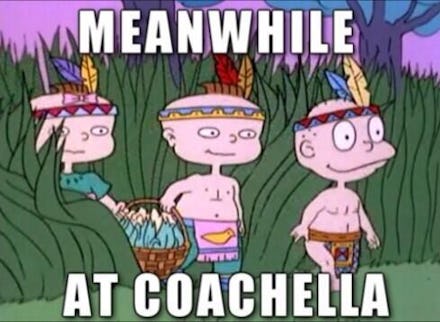Why So Many American Indians Have an Issue With Coachella

The news: At this point, the Coachella Valley Music and Arts Festival has inevitably devolved into a parody of itself. Blinding sunshine, massive crowds, exorbitant ticket prices and rampant teenage drug abuse have bolstered its reputation as the yearly paean to rich kid debauchery you love to hate, and the one most people would inexplicably still commit murder to attend.
But amidst all the bare skin and disappointed Outkast fans is another issue that bears discussing. It is perhaps best encapsulated by this meme:
Image Credit: Twitter
That genre classic was recently tweeted by Ruth Hopkins, a contributor to the Indian Country Today Media Network. It refers to the ongoing pattern of non-Native Coachella attendees rocking traditional American Indian attire they would never wear elsewhere, like it was a Batman costume or something.
It's become so much of a "thing" that even famous people don the dreaded "hipster headdress" — considered, "not racist, what are you talking about?" because it's worn "ironically" or as "fashion" — to get "inspired" for the festival:
Image Credit: Instagram
Needless to say, many Natives are not fans of the trend. But that hasn't stopped the festival from capitalizing on the "white kids playing Indian" motif and offering tipi rentals for the low weekend price of ... $2,200? Paying rent in a New York City rat hole never sounded so good:
Image Credit: Indian Country Today Media Network
None of this is particularly shocking. The practice is as old as the festival itself, resulting in hashtags like #NativeAppropriation and #Don'tTreadOnMe being used to highlight some of the most egregious perpetrators:
Politics as usual: The appropriation of Native cultural markers as costumes, mascots and fashion accessories has been a hot topic lately. It's arguably seen its most vocal manifestation in the debate around the Washington Redskins, Dan Snyder's NFL franchise that refuses to change its name despite being an obvious racial slur.
The discussion continued with the recent "de-chiefing" protests, where Cleveland Indians fans started removing the Sambo-esque "Chief Wahoo" image from their MLB attire. And finally, even aside from the Alessandria Ambrosio picture, the fashion industry has faced heat for its insensitive use of headdresses and face paint at runway shows and photo shoots. I'm talking to you, Heidi Klum.
Image Credit: Facebook
Why this matters: In 2010, the Native Appropriations blog assembled a useful breakdown of why many American Indians frown on these practices. The crux of the argument is that they amount to more than just "fashion" — headdresses in particular hold "deep spiritual significance," akin to a burka or yarmulke. Wearing them as costumes also references a time when "playing Indian" was more common in pop culture, and the media used it to stereotype, dismiss and dehumanize Natives in ways that helped justify their marginalized status.
Other reasons are obvious, but bear repeating: Coachella, along with everything else in this country, takes place on land that was stolen from American Indians as part of a massive multi-generational genocide, the impact of which persists today. Natives face disproportionately high rates of alcoholism, suicide and depression, among other things. If they say they don't want you treating their culture like your own personal Halloween party, do humanity a favor and listen.
These Coachella attendees aren't the only perpetrators, of course. But it's reached a point that people commonly associate the festival with rich white kids in Native headdresses, and that's not something to be proud of. With the issue of cultural appropriation becoming an increasingly high-profile topic of discussion, one would hope more people start realizing how problematic such actions are and adjust themselves accordingly.
Until then, #Nochella might be the less facepalm-inducing alternative.